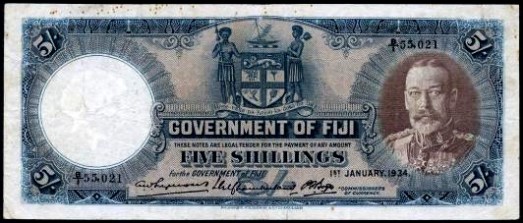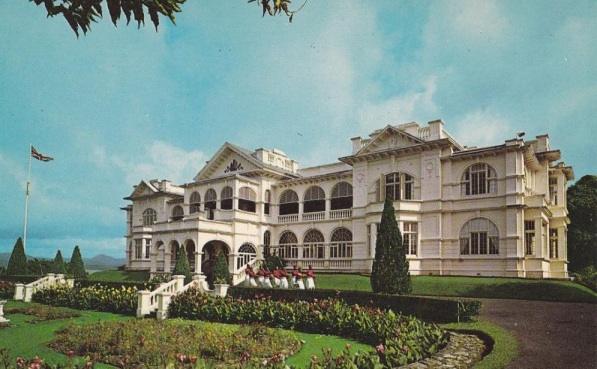(BRITISH COLONY OF FIJI) 1874 – 1970

Fiji fue una colonia de la corona británica que existió de 1874 a 1970 en el territorio de la actual nación de Fiji. El Reino Unido declinó su primera oportunidad de anexar el Reino de Fiji en 1852. Ratu Seru Epenisa Cakobau había ofrecido ceder las islas, a condición de que se le permitiera conservar su título de Tui Viti (Rey de Fiji), una condición inaceptable tanto para los británicos y para muchos de sus compañeros jefes, que lo consideraban sólo como primero entre iguales.

ESCUDO DE FIJI.
Tras una serie de deudas contraídas, las amenazas de la Marina de Estados Unidos había llevado a Cakobau a establecer una monarquía constitucional con un gobierno dominado por colonos europeos en 1871, luego de un acuerdo con la Compañía Australiana de Polinesia para pagar sus deudas. El colapso del nuevo régimen lo llevó a hacer otra oferta de cesión en 1872, que los británicos aceptaron. El 10 de octubre de 1874, Gran Bretaña comenzó su gobierno de Fiji, que duró hasta el 10 de octubre de 1970.

ULTIMO GOBERNADOR BRITANICO, ROBERT SIDNEY FOSTER.
Sir Hércules Robinson, que había llegado el 23 de septiembre de 1874, fue nombrado gobernador interino. Fue sustituido en junio de 1875 por Sir Arthur Gordon. En lugar de establecer un gobierno directo en todas las esferas, Gordon concedió autonomía sobre los asuntos locales a los jefes de Fiji, aunque ahora les estaba prohibido participar en la guerra tribal. La colonia estaba dividida en cuatro regiones, cada una bajo el control de un Roko; estas regiones se subdividieron en doce distritos, cada uno gobernado por un jefe tradicional.

1 SHILLING – JORGE V – 1934.

6 PENIQUES – JORGE VI – 1941.

3 PENIQUES – ISABEL II – 1965.
Un Gran Consejo de Jefes fue establecido en 1876 para asesorar al Gobernador. Este cuerpo se mantuvo en existencia hasta que fue suspendido por el gobierno interino respaldado por Militares en 2007 y abolido en 2012. Bajo la Constitución de 1997, funcionó como un colegio electoral que eligió Presidente de Fiji.

BILLETE DE 5 SHILLINGS EFIGIE DE JORGE V.

BILLETE DE 10 DOLARES EFIGIE DE JORGE VI.

BILLETE DE 1 DOLAR EFIGIE DE ISABEL II.
En julio de 1965 se celebró en Londres una conferencia constitucional para discutir los cambios constitucionales con miras a introducir un gobierno responsable. Los indo-fijianos, dirigidos por A. Patel, exigieron la inmediata introducción de un gobierno autónomo completo, con una legislatura completamente elegida, para ser elegidos por sufragio universal en una lista común de votantes. Estas demandas fueron rechazadas vigorosamente por la delegación étnica de Fiji, que todavía temía la pérdida de control sobre las tierras y los recursos de propiedad nativa si un gobierno dominado por indofijianos llegara al poder. Los británicos lo dejaron claro, sin embargo decidieron a llevar a Fiji al autogobierno y a la eventual independencia.

SELLO JORGE V.

SELLO JORGE VI.

SELLO ISABEL II.
The Colony of Fiji was a British crown colony that existed from 1874 to 1970 in the territory of the present-day nation of Fiji. The United Kingdom declined its first opportunity to annex the Kingdom of Fiji in 1852. Ratu Seru Epenisa Cakobau had offered to cede the islands, subject to being allowed to retain his Tui Viti (King of Fiji) title, a condition unacceptable to both the British and to many of his fellow chiefs, who regarded him only as first among equals, if that. Mounting debts and threats from the United States Navy had led Cakobau to establish a constitutional monarchy with a government dominated by European settlers in 1871, following an agreement with the Australian Polynesia Company to pay his debts. The collapse of the new regime drove him to make another offer of cession in 1872, which the British accepted. On 10 October 1874, Britain began its rule of Fiji, which lasted until 10 October 1970.

OFICIAL BRITANICO CON NATIVOS DE FIJI.
Fiji was only peripherally involved in World War I. One memorable incident occurred in September 1917 when CountFelix von Luckner arrived at Wakaya Island, off the eastern coast of Viti Levu, after his raider, the Seeadler, had run aground in the Cook Islands following the shelling of Papeete in the French territory of Tahiti. On 21 September, the district police inspector took a number of Fijians to Wakaya, and von Luckner, not realizing that they were unarmed, unwittingly surrendered.

TROPAS BRITANICAS EN FIJI.
Citing unwillingness to exploit the Fijian people, the colonial authorities did not permit Fijians to enlist. One Fijian of chiefly rank, a greatgrandson of Cakobau’s, did join the French Foreign Legion, however, and received France’s highest military decoration, the Croix de Guerre. After going on to complete a Law degree at Oxford University, this same chief returned to Fiji in 1921 as both a war hero and the country’s first-ever university graduate. In the years that followed, Ratu Sir Lala Sukuna, as he was later known, established himself as the most powerful chief in Fiji and forged embryonic institutions for what would later become the modern Fijian nation.

VISITA DE LA REINA ISABEL II A FIJI.
By the time of World War II, the United Kingdom had reversed its policy of not enlisting natives, and many thousands of Fijians volunteered for the Fiji Infantry Regiment, which was under the command of Ratu Sir Edward Cakobau, another greatgrandson of Seru Epenisa Cakobau. The regiment was attached to New Zealand and Australian army units during the war.

SUVA FUE LA CAPITAL DE LA COLONIA.
The Empire of Japan’s attack on Pearl Harbor, on 8 December 1941 (Fiji time), marked the beginning of the Pacific War. Japanese submarines launched seaplanes that flew over Fiji; Japanese submarine I-25 on 17 March 1942 and Japanese submarine I-10 on 30 November 1941.

ANTIGUA MANSION DEL GOBERNADOR.
A constitutional conference was held in London in July 1965, to discuss constitutional changes with a view to introducing responsible government. Indo-Fijians, led by A. D. Patel, demanded the immediate introduction of full self-government, with a fully elected legislature, to be elected by universal suffrage on a common voters’ roll.

These demands were vigorously rejected by the ethnic Fijian delegation, who still feared loss of control over natively owned land and resources should an Indo-Fijian dominated government come to power. The British made it clear, however, that they were determined to bring Fiji to self-government and eventual independence. Realizing that they had no choice, Fiji’s chiefs decided to negotiate for the best deal they could get.

OTRAS DE MIS WEBS
CEUTA DESCONOCIDA: http://www.ceutadesconocida.wordpress.com
